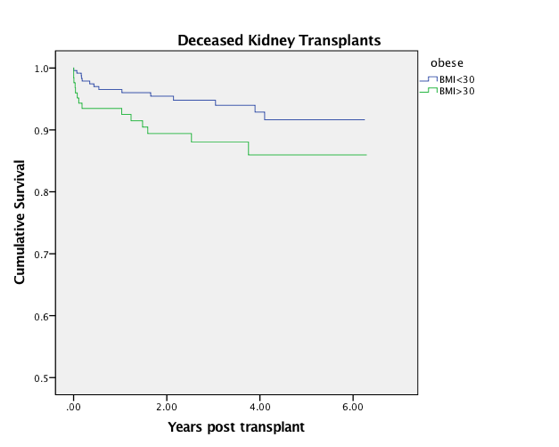Obesity Is an Important Factor in Deceased but Not Living Donor Kidney Transplants.
A. Asderakis, A. Ilham, U. Khalid, R. Chavez.
Cardiff Transplant Unit, University Hospital of Wales, Cardiff, United Kingdom
Meeting: 2017 American Transplant Congress
Abstract number: D146
Keywords: Graft survival, Kidney transplantation, Obesity
Session Information
Session Name: Poster Session D: Kidney: Cardiovascular and Metabolic
Session Type: Poster Session
Date: Tuesday, May 2, 2017
Session Time: 6:00pm-7:00pm
 Presentation Time: 6:00pm-7:00pm
Presentation Time: 6:00pm-7:00pm
Location: Hall D1
Introduction There is an increasing obesity among potential kidney transplant recipients. We had in the past shown that obesity did increase the wound infection rate, and in-hospital stay but did not decrease graft survival.
Aim To establish if obesity is associated with different outcomes in kidney transplants in the modern era.
Patient and Methods All the transplants that were performed in a single centre over 6 years were included. Patients were divided to 2 groups according to their BMI (BMI<30 vs. BMI>30). Graft and patient survival, wound infections, and in hospital stay were compared separately in living donor and deceased kidney transplants.
Results There were 249 kidneys from living donors and 508 from deceased donors. Recipients BMI varied from 16 to 44 (median 27 kg/m2) . 30% of recipients had BMI>30kg/m2.
There was no difference in graft survival in living donor kidney transplants between patients with lower and higher BMI (at 5 years 93% of grafts survived in both groups). Higher BMI recipients from living donors had a longer in-hospital stay and a numerically increased wound infection rate (p=0.2).
In contrast, in deceased donor kidney recipients, the graft survival at 1 and 5 years post transplant among recipients with BMI<30 was 96% and 91% vs. 93% and. 85% among recipients with BMI>30 (p=0.05)  Patient survival did not differ between the two BMI groups either in living donor or deceased kidney transplants.
Patient survival did not differ between the two BMI groups either in living donor or deceased kidney transplants.
Conclusion The analysis of our current patient cohort shows that a BMI>30kg/m2 , apart from an increased in-hospital stay and wound infection rate, is associated with lower 5-year graft survival in recipients who received a deceased kidney transplant but not in those who received a living donor graft. These results will help to consent recipients accordingly and justifies the support to programs that aim to reduce weight as it is one of the few modifiable recipient risk factors.
CITATION INFORMATION: Asderakis A, Ilham A, Khalid U, Chavez R. Obesity Is an Important Factor in Deceased but Not Living Donor Kidney Transplants. Am J Transplant. 2017;17 (suppl 3).
To cite this abstract in AMA style:
Asderakis A, Ilham A, Khalid U, Chavez R. Obesity Is an Important Factor in Deceased but Not Living Donor Kidney Transplants. [abstract]. Am J Transplant. 2017; 17 (suppl 3). https://atcmeetingabstracts.com/abstract/obesity-is-an-important-factor-in-deceased-but-not-living-donor-kidney-transplants/. Accessed February 19, 2026.« Back to 2017 American Transplant Congress
